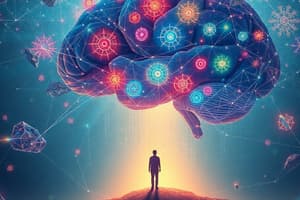Podcast
Questions and Answers
What is collaborative inhibition?
What is collaborative inhibition?
- The recollection of items that are similar in nature
- The memory aid provided by collaborative efforts
- The decrease in the number of items recalled by individuals working together (correct)
- The improvement in memory recall when working in groups
Which statement best describes transience in memory?
Which statement best describes transience in memory?
- Most forgetting happens immediately after an event occurs (correct)
- Memory retrieval is always reliant on the strength of encoding
- Forgetting occurs at a steady pace over time
- Forgetting is solely influenced by emotional states
What is retroactive interference?
What is retroactive interference?
- When past memories interfere with the recall of new information
- When memories are permanently erased with new learning
- When recent experiences alter the memory of older information (correct)
- When two unrelated memories blend together inaccurately
What causes absentmindedness according to the content?
What causes absentmindedness according to the content?
Which type of memory failure is associated with memory misattribution?
Which type of memory failure is associated with memory misattribution?
What does suggestibility in memory refer to?
What does suggestibility in memory refer to?
Change bias affects memory by doing what?
Change bias affects memory by doing what?
What is the role of the left frontal lobe in memory?
What is the role of the left frontal lobe in memory?
Which phenomenon describes the feeling of familiarity with a new situation as if it has happened before?
Which phenomenon describes the feeling of familiarity with a new situation as if it has happened before?
What is proactive interference?
What is proactive interference?
Flashcards
Collaborative Inhibition
Collaborative Inhibition
When people recall less information together than they would individually.
Transience
Transience
Forgetting that occurs over time, primarily in the initial stages after learning.
Retroactive Interference
Retroactive Interference
New learning disrupts old memories.
Proactive Interference
Proactive Interference
Signup and view all the flashcards
Absentmindedness
Absentmindedness
Signup and view all the flashcards
Prospective Memory
Prospective Memory
Signup and view all the flashcards
Blocking
Blocking
Signup and view all the flashcards
Memory Misattribution
Memory Misattribution
Signup and view all the flashcards
Source Memory
Source Memory
Signup and view all the flashcards
Change Bias
Change Bias
Signup and view all the flashcards
Study Notes
Collaborative Memory
- Collaboration can improve memory.
- Collaborative inhibition: groups recall fewer items than individuals working alone.
Forgetting
- Transience: Forgetting increases with time, but most forgetting occurs soon after the event.
- Retroactive interference: Later learning impairs earlier memories.
- Proactive interference: Earlier learning impairs later memories.
Absentmindedness
- Absentmindedness: A lapse in attention leading to memory failure.
- Dividing attention prevents proper semantic encoding in the lower left frontal lobe.
- Prospective memory failures contribute to absentmindedness.
Blocking
- Blocking: Inability to retrieve available information.
- Blocking is common for names and locations due to weaker connections to related concepts.
Memory Misattribution
- Memory misattribution: Incorrectly assigning a memory or idea to the wrong source.
- Source memory: Recalling when, where, and how information was learned.
- Deja vu: feeling of familiarity with something that should be unfamiliar.
- Frontal lobe damage increases errors in memory misattribution.
- Similar brain regions are active during true and false recognition, including the hippocampus.
Suggestibility
- Suggestibility: Incorporating misleading information into memories.
- Incomplete memory storage makes us susceptible to suggestions.
Bias
- Bias: Present knowledge, beliefs, and feelings affect memory recall.
- Current mood influences memory of past experiences.
- Change bias: Exaggerating differences between past and present beliefs.
- People remember the past as they want it to be, not how it truly was.
Persistence
- Persistence: Unwanted recollection of events.
- Emotional experiences create more vivid, lasting memories.
- Flashbulb memories: Detailed memories of surprising events.
- The amygdala and hormonal systems play a key role in the vividness of these memories.
Studying That Suits You
Use AI to generate personalized quizzes and flashcards to suit your learning preferences.




